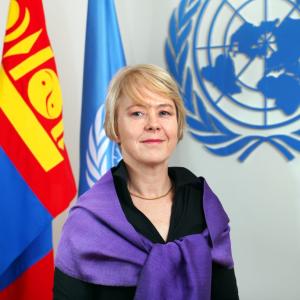Your Excellency Mr. D. Davaasuren, State Secretary of Minister of Foreign Affairs,
Representatives of the Government,
UN colleagues,
Distinguished Guests,
I know it’s always hard to find time for meetings in June ahead of the summer break. And on behalf of all UN in Mongolia, thank you all for being here today.
When we started collaborating on the new UN Development Assistance Framework in 2015, we did not yet have Sustainable Development Goals for 2030. And, when the Mongolia UNDAF was signed, in June 2016, we did not yet have all the global indicators to monitor the SDGs. So in this sense, our first year of carrying out the new UNDAF was one of transition, and adaptation.
2017 was also the first year for Mr. Antonio Guterres as UN Secretary-General. And when he first addressed the General Assembly he stated his commitment to supporting member states to achieve the new global goals. To do this, he said: [quote]
“We (the UN) will reposition development at the centre of our work, and engage in a comprehensive reform of the United Nations development system, at Headquarters and country levels. This must involve leadership, coordination, delivery and accountability.”
So, in the spirit of leadership, coordination, delivery and accountability, and, if I might add to his words, in the spirit of partnership, we are gathered here today to report on what we have achieved in implementing the UNDAF in 2017, and discuss ways forward together.
During this year of change, we kept the key message of the 2030 Agenda - “leave no one behind” – at the heart of our projects across all 21 aimags in Mongolia. In our initiatives, we focused on making development in Mongolia more inclusive, more equitable and more sustainable for this generation and future ones to come. We worked with the national government as well as local governments. We also worked with different civil society organizations, along with the private sector. And above all, we worked to forge partnerships to bring all these actors to together to jointly advance the cause of sustainable and inclusive development.
Through our partnerships, we supported the creation of new legislation aligned with international standards and human rights; we contributed to the formulation of critical public policies and plans; we provided support to creating the data and the evidence base for the SDGs and to inform policy choices in important areas such as combatting air pollution, climate change and reducing non-communicable diseases; we helped analyse financing opportunities and mobilized funding for the SDGs; we helped to strengthen the capacities of institutions and actors responsible to implement policies and laws and we supported communities and citizens to carry out sustainable development initiatives in their communes and districts for everyone to benefit.
One of the highlights of 2017 for me was the SDGs Mainstreaming, Acceleration and Policy Support (MAPS) mission fielded in November. Aimed at advising the Government on how to achieve key social and environmental SDGs within the tight budgetary constraints of the IMF EFF package, we were not only able to bring together UN agencies, UNDP, UNFPA, UNICEF and others, but also to partner with ADB in this key endeavor. The MAPS mission found that new methods are needed for Mongolia to achieve the SDGs. The top three priorities identified are:
- Firstly, coherent policy-making and strong coordination at all levels;
-Secondly, aligning annual budgets with the priorities of the SDGs and SDV;
-Thirdly, establishing monitoring systems to report progress.
We will be presenting the results and recommendations of this exercise to the Prime Minister and the Cabinet next week in a high level SDG forum. We, the UN system, with the Government of Mongolia and other partners and stakeholders will continue to work on these priorities together.
Last year, the UN system disbursed US$15.64 million, towards inclusive, sustainable development in Mongolia. But only with united efforts, funding and monitoring can we realize the ambitious 2030 Agenda to end poverty, reduce inequality and protect the planet.
My colleagues of the UN Country Team and chairs of the Outcome Results Groups will highlight our main achievements in the past year. And as you will see, - and this is a first - we have structured the presentations in a manner to qualify and quantify our contributions towards the SDGs in Mongolia. But I’m certain we can and must do more. In the future, as part of the reform spearheaded by the UNSG we will therefore increasingly also be looking at combining UN back office operations beyond current efforts for greater efficiency and cost effectiveness.
I will now hand over to my colleagues for the presentation of results under each of the 3 UNDAF outcomes. After the presentations, we will have time for dialogue and I much look forward to hearing your comments, suggestions and recommendations for our work in 2018, 2019 and beyond.
I would like to end with the reminder of why we are all here – that behind all the meetings, policies and numbers are more than 3 million people, counting on us to get it right. And we can only do so together.



















